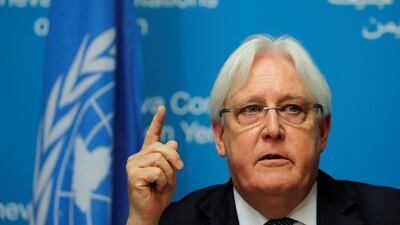Yemen’s warring parties have agreed to attend peace talks in Sweden “shortly”, according to the United Nations special envoy to the country, who said he was willing to accompany the Houthi delegation from Sanaa if necessary.
Addressing the UN Security Council on Friday, Martin Griffiths thanked the Saudi-led coalition for agreeing to the conditions needed for consultations and said it marked a critical moment in trying to find peace.
Minutes later the British ambassador to the UN said she would circulate a Security Council resolution on Monday calling for a humanitarian truce.
Karen Pierce said it would enshrine five requests made by the UN’s humanitarian chief including efforts to protect the supply of food, inject money into the economy and for the warring parties to engage in peace talks.
The developments come at the end of a renewed international push to end a conflict that has killed more than 10,000 people and brought the country to the brink of famine since Iranian-backed Houthi rebels seized the capital Sanaa in 2014.
“This is a crucial moment for Yemen. I have received firm assurances from the leadership of the Yemeni parties ... that they are committed to attending these consultations,” said Mr Griffiths. “I believe they are genuine and I expect them to continue in that way.”
It is understood the officials hope the two sides can meet in Stockholm by the end of the year to discuss a framework for talks.
Mr Griffiths, a British mediator, had hoped to be able to announce a prisoner exchange but said talks were continuing on what could be an important confidence-building measure.
He added: “I am grateful to the coalition for agreeing our proposed logistical arrangements and to the coalition and Oman for their agreement to facilitate the medical evacuation of some injured Yemenis out of Sanaa.”
The transport of wounded Houthi fighters proved to be a significant stumbling block the last time the two sides were slated to meet. Talks were abandoned in September when Houthis said they had not received assurances their plane would not have to stop in Djibouti for inspection by the Saudi-led coalition.
Mr Griffiths said he is still trying to finalise the logistics for the new round and will travel to Sanaa next week to meet Abdulmalik Al Houthi, the rebel leader.
“And I will also be happy to travel myself, if necessary, with their delegation to the consultations if that is needed,” he said.
_______________
Read more:
UAE, Saudi, UK and US establish committee to address Yemen war
Arab Coalition ends US refuelling deal in Yemen
Second Houthi minister defects, deepening rifts in rebel group
_______________
Aid groups say that Yemen is on the brink of famine and that any intensification of recent fighting around Hodeidah – the port city through which 80 per cent of the country’s food imports and aid supplies arrive – would plunge the country further into crisis.
Senior humanitarian officials briefed the Security Council on the latest conditions inside the country.
Mark Beasley, the head of the World Food Programme, said: "This is not on the brink of a catastrophe. This is a catastrophe.”
He said tackling the country’s economic crisis was vital to saving lives.
“You cannot solve the humanitarian crisis in Yemen today with humanitarian response alone. It's now going to require an economic infusion of substantial liquidity. Both are going to be required to avert a famine,” he said.
Yemen’s currency, the rial, has lost more than half its value against the dollar since the start of the war. That has put many basic commodities out of reach of ordinary Yemenis and the central bank has struggled to pay salaries.
Mark Lowcock, the UN’s humanitarian co-ordinator, praised the efforts of Saudi Arabia and the United Arab Emirates in providing US$70 million (Dh257m) to cover allowances for 135,000 teachers.
“We see this as a best practice, and discussions with potential donors on replicating it for health and sanitation workers, as well as for pensioners, are at an advanced stage,” he said.
A Saudi injection of $200m in the Central Bank had also strengthened the rial, he said, and may have helped reduce food prices.
Ms Pierce, the British representative, urged the council to support the efforts to bring peace.
“My foreign secretary was in the region earlier this week because, like Martin and I think the rest of the you, we do believe there is a window of opportunity to tackle this man-made crisis in Yemen,” she said.
“I just want to emphasise the man-made bit. What men have created men can resolve. So I think that's another reason for all possible effort to be put behind the political track.”

